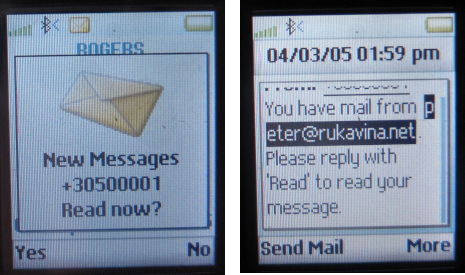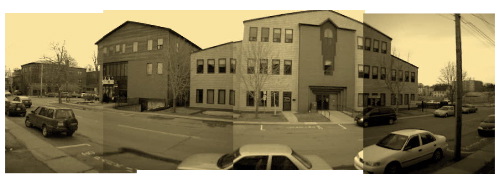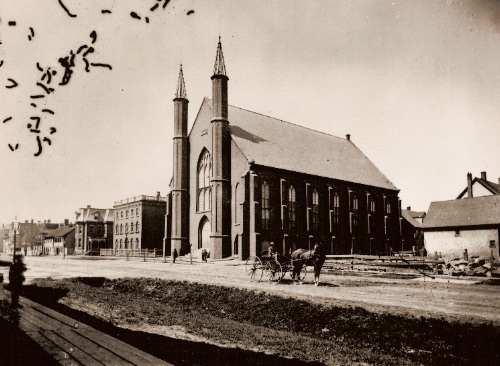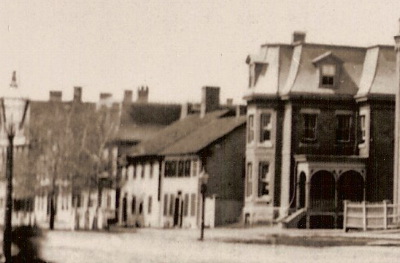It used to be that it was worth my while to stay over a Saturday night in Boston on the tail end of my trips to Yankee to take advantage of the much, much cheaper “Saturday night stay” airfares on Air Canada. Now that this advantage has largely been eliminated, I’m left to enjoy the city in little time packets before or after heading up here to New Hampshire.
And so early this evening, after catching the end of the meetings I’d mostly missed at Yankee’s Boston office, I headed over to Harvard Square for a bit. I managed to squeeze some of my favourite things into a short space of time:
- I visited the Globe Corner Bookstore, which is a fantastic travel bookstore. It’s on Church St. just up the street from the movie theatre. I found a great book on southern France that I’d not seen elsewhere.
- I had a wonderful vegetarian meal at Veggie Planet, located under the bookstore and sharing space with the venerable Club Passim. I’m not entirely sure what I had — I just ordered the daily dinner special — but it involved brown rice, goat cheese, avocados and black beans. It was amazing. Also had a great elderberry iced tea.
- I browsed the magazine stands at the Harvard Coop and at Out of Town News, located across the street from each other just around the corner. Got a good map of France and a nice small Moleskin at the Coop too.
- I finished the night with some sort of exotic hot chocolate drink at Starbucks — it was called “Contata” or “Tochino” or something like that. 6oz. of chocolate heaven.
Then it was in the car and up to Peterborough, NH where I type this on the plentiful WiFi of the much-referenced Jack Daniel’s Motor Inn.
I showed up at Charlottetown Airport this morning bright and early at 6:00 a.m. ready for my 6:45 a.m. flight. Usually at this hour there are one or two people in line, never more than 5 or 6. Today there were about 25. I immediately knew something was up.
It turns out that our flight to Montreal was to happen on a plane that was to have arrived last night, but didn’t. So there was no plane. And the flight was cancelled.
Not that Air Canada bothered to tell us this: there was an informal information gravevine running up and down the line; with each new person to the desk we’d here a little more — next flight at noon, no compensation, lots of problems with connections.
I had the misfortune of being directly behind two groups travelling to southeast Asia. The lack of an early flight meant that their entire itinerary had to be rearranged. Needless to say, troopers though they may be, the Air Canada counter staff in Charlottetown aren’t experts at planning multi-connection trans-Pacific itineraries. It took awhile.
I finally got to the head of the line around 7:30 a.m. — just over an hour of standing — and was resassigned to a Noon flight, putting me in Boston at 3:00 p.m., four hours late and after the meetings downtown that were specially planned to accommodate my travel plans. I suppose I should feel lucky: the woman travelling to Vietnam was going to be 24 hours late arriving there.
All the while the flight information screens — still reading Standard Time — were announcing that the flight for Montreal was “Boarding.” Except there was no plane. And no flight.
As with most of my “Air Canada is evil incarnate” posts my chief peeve with Air Canada’s behaviour is their attitude more than whether or not they happen to have the right planes in the right place. Air Canada is as much in the information business as it is in the people moving business, but it doesn’t seem to realize that.
How about an email last night when you knew the plane wasn’t going to be there? How about an announcement over the PA in the terminal to soothe the jangled nerves of those of us in line? How about an apology when we finally got to the counter? How about flight informations screens that give information. About flights.
The impression one is left with from Air Canada today is that they’ll little concept that their customers use their planes to go real places and do real things. Things with deadlines. And hurt feelings. Things that Matter. They seem to think that if they get you to your destination, eventually, they’ve done their bit.
As soon as I knew I was going to miss my Boston meetings I immediately sent a heads-up email to my colleagues at Yankee, and then followed up with a couple of phone calls once the hour was more reasonable. Not a perfect solution, but at least I cared enough to keep them in the loop. It’s a shame my airline couldn’t extend the same courtesy.
Oh yah, the tomato juice. I’m not sure if this is a uniquely Canadian thing, but all Air Canada flights and lounges server Mott’a Clamato juice, which is tomato juice mixed with clam broth. I’ve never seen this on another airline — Catherine asked once on JAL in Tokyo and they looked at her real strange. The only time I drink Mott’s Clamato juice is when I fly Air Canada. Normally the idea would frighten and disgust my, but in the total perspective vortex that is flying, it seems quite right. The Extra Spicy is especially nice.
There’s an update to this story, posted June 2, 2005.
Although I bought a Sony Ericsson T610 mobile phone primarily to take to Europe, I thought I’d use the opportunity to also activate the phone on Rogers mobile network here in Canada.
Activation was easy: I just phoned Rogers, gave them the serial number of the phone and the serial number of the Rogers SIM card I’d purchased retail in Ontario, and the phone was activiated within an hour.
One of the things I use mobile phones for most is their ability to receive text messages via email. I’ve been using my Island Tel Mobility phone in this way for many years, and it’s hooked up to our network monitoring system here at the office so that I get “paged” in the event of problems. Although historically the Island Tel network has had reliability problems, these seem to have been largely cleared up as of late, and the system works well for me.
I was eager to try out Rogers system for doing the same thing. Every Rogers phone comes with its own email address: XXXXXXXXXX@pcs.rogers.com (where you replace the Xs with your area code and mobile number). So I sent myself off an email and waited for the T610 to jangle news of its arrival. Here’s what happened:

Rather than actually just sending me the message, Rogers sent me a “you’ve got mail” message, to which I needed to reply to get the actual message sent to me.
This is insane.
It’s insane because it means a complicated extra step must be taken for every email received — perhaps trivial for one message, but when a network problem happens I often get 10 or 15 email messages.
It’s insane because although Rogers doesn’t charge for incoming text messages, they do charge for outgoing ones, so to be able to retrieve an email message I have to pay Rogers 15 cents.
And those two things together make it doubly insane because the network resources that Rogers used to send the “you’ve got mail” message could have simply been used to send the actual message in the first place.
And finally it’s just another depressing move by a mobile company that doesn’t “get” that their phones will be used by more people more often if they build an open, flexible network that lets others build useful applications on its functionality rather than trying to replicate the “walled kingdom” of land-line telephony without wires.
I emailed Rogers about this “feature” and received this reply:
In response to your inquiry, our new email to text service, unfortunately, it is not possible to remove the alerts to receive your message, below, we have added the link to our website for the details on this program.
This isn’t a great problem for me — I just won’t continue to use the T610 in Canada once my initial “pay as you go” time with Rogers is used up. I just hope that my friends at Aliant don’t decide to move in a similar direction.
As a special bonus, it looks like the Quirks and Quarks podcast is actually released on Friday night, which is almost 24 hours ahead of when it appears on “real” radio, at least here in Charlottetown. Cool.
Here’s another photo from the PEI Provincial Archives that happened my way yesterday: it shows the corner of Kent and University in downtown Charlottetown. The building pictured is, believe it or not, what lurks underneath the building that’s still there, the former home of Sam The Record Man and CFCY. The world would be so much nicer if we’d been able to skip the “let’s cover everything up” craze of the 1960s and 1970s. G. says there’s equal splendour under the Holman’s building facade on Grafton St.

It is a beautiful spring day here in Charlottetown, the kind of day that unearths the latent memory of why we live in this city in this province despite the cold and snow half the year. The new phone, with built-in camera, arrived today, and to try it out I snapped some pictures from the front stoop of the office. The camera was still in “sepia mode” when I took the photos, which explains their brown-and-whiteness. I then stitched them together in a sort of home-brew panorama:

Here’s an undated photo of Prince Street in Charlottetown, near the corner of Richmond. Trinity United Church is front and center; our house is 3 doors north.

Here’s an expanded detail from the photo, showing our house:

VISA has a very helpful guide to Collision Loss Damage Insurance on rental cars. It answered a lot of questions I had about what is covered and what isn’t.
On the wall of my parents basement is a large map that charts the progress of my father’s surveys of the sediments in the Great Lakes. It’s also a map showing where we spent our summers in the late 1960s and early 1970s because the whole family used to travel with Dad, camping in the nearest provincial park to where he was working. We watched the moon landing on a small black and white television in the back of a VW microbus on one such expedition.
Two new web resources, the NWRI Sediment Archive and the Great Lakes’ Shoreline Photos collection are another two artifacts of those summers; together they are, in a sense, the raw materials of Dad’s entire working life.
The other constant in those provincial parks those summers was the showing of Bill Mason’s film The Rise and Fall of the Great Lakes. I must have seen this film a hundred times by now, and I enjoy it every time; it’s a 16 minute journey through the history of the Great Lakes from the eyes of a man in a time-traveling canoe.
 I am
I am